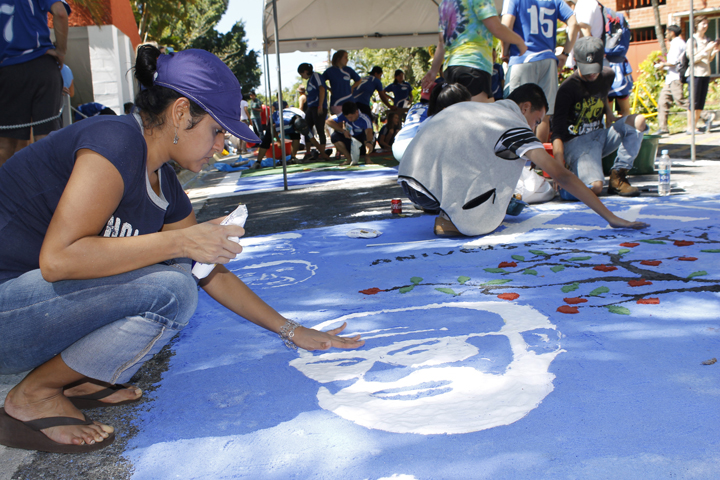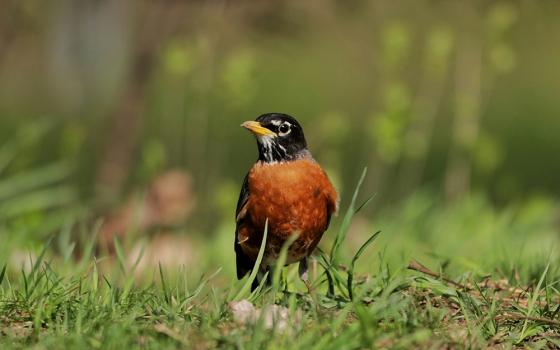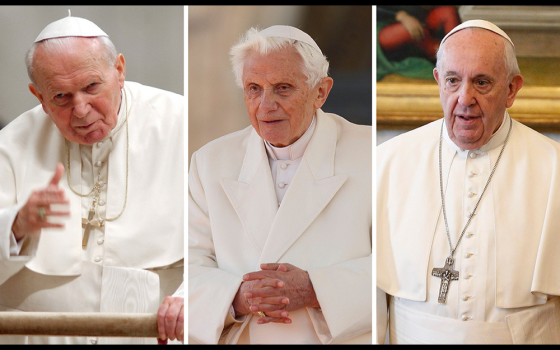
Ivette Escobar, a student at Central American University in San Salvador, helps to finish a rug Nov. 15, 2014, in honor of the victims in the 1989 murder of six Jesuits, their housekeeper and her daughter on the UCA campus. It was part of the 25th anniversary commemoration of the Jesuit martyrs. (CNS/Edgardo Ayala)
Former Salvadoran Col. Inocente Orlando Montano sat in an orange jumpsuit in a North Carolina courtroom Aug. 19 as a federal judge considered his fate. It was some 1,700 miles from the room where he allegedly sat in military uniform 26 years ago with the Salvadoran high command, to plot the assassinations of six Jesuit priests.
U.S. Magistrate Judge Kimberly Swank is deciding whether Montano, who falsified documents to enter the U.S. in 2002, will be extradited to Spain, which wants to prosecute him for one of the most shocking crimes in El Salvador’s civil war.
The Spanish indictment relies in part on the 1993 United Nations Truth Commission report, which named Montano as one of the military high command that ordered the murders.
U.S.-trained Salvadoran soldiers stormed Central American University in San Salvador and blew out the brains of the Jesuits with high-powered weapons. They then executed their housekeeper and her daughter to eliminate witnesses of the Nov. 16, 1989, massacre. Five of the six priests were Spanish nationals, including main target, Fr. Ignacio Ellacuría, the university rector.
Montano holds an engineering degree from that very Jesuit university, and was the Commander of the Army’s Engineering Brigade before becoming the Vice Minister of Defense for Public Safety just five months before the massacre. He had also taken an engineer officer course at the U.S. Army’s School of the Americas located at Fort Benning, Ga., now known as the Western Hemisphere Institute for Security Cooperation.
Swank surprised many at the Aug. 19 hearing by delaying her decision at least a month to allow both sides to file written arguments in addition to what they presented in court.
“But she was taking a cautious and wise approach,” said Carolyn Patty Blum, senior legal advisor with the Center for Justice and Accountability (CJA), an international non-profit human rights organization based in San Francisco.
Blum and Almudena Bernabeu, CJA’s international attorney, both told NCR that the judge was bending over backwards to ensure that Montano had full due process.
Bernabeu filed a 2008 suit with Spain’s National Court, in conjunction with the Spanish Human Rights Association, which ended in the indictments of Montano and 19 other officers in 2011. That same year, CJA found that Montano had been living quietly outside of Boston and then notified U.S. officials who had him arrested.
At the hearing, Montano’s public defender, James Todd, questioned whether the five priests had retained their Spanish citizenship while living in El Salvador.
The judge was clearly taken aback, Blum said, that Todd was in effect asking her to “second-guess a Spanish court’s decision concerning who their own citizens are.”
Federal prosecutor John Capin objected to Todd’s reading of dozens of declassified diplomatic cables, saying Todd was trying to argue the merits of the criminal case.
However, Swank allowed the reading of the cables, although she had clearly stated that the scope of the extradition hearing was limited to four issues: Whether there was a valid extradition treaty between the U.S. and Spain; whether the alleged crime was a crime in both countries and punishable by more than a year; whether the person before the court was the accused person; and whether there was probable cause to extradite him.
The first three were essentially a slam dunk, Blum said, and “the prosecution had more than met its burden of proof for probable cause.”
The prosecution had relied in part on the 1993 United Nations Truth Commission report, which concluded that Montano was at the key meeting where the Salvadoran high command decided to proceed with the assassinations. The following day, an elite "anti-terrorist" unit executed the priests using Russian-made AK-47s in an attempt to implicate the rebels.
The slain Spanish Jesuits were Ellacuría, Ignacio Martín-Baró, Segundo Montes, Juan Ramón Moreno and Amando López. The sixth priest, Joaquín López y López, was from El Salvador as were the priests' cook Julia Elba Ramos and her daughter Celina.
The prosecution also noted that Montano shared “oversight responsibility over a government radio station that, days before the massacre, issued threats urging the murder of the Jesuit priests.”
Montano, 73, has denied any role in the massacre.
He has also denied that he had ever served in the military. That’s what he had falsely claimed on U.S. immigration papers in 2002 and again on later documents in order to maintain his Temporary Protected Status.
After CJA outed him in Boston, Montano was convicted in 2013 for immigration fraud and perjury and handed a 21-month federal prison sentence, which he served in North Carolina. He completed that sentence in April and has been held there pending the outcome of his extradition case.
If Swank signs the extradition order, Montano would become the highest-ranking official extradited from the United States for human rights violations.
The extradition would allow the Spanish Court to begin a historic trial on the Jesuit massacre. The court has yet to obtain a defendant to proceed with the prosecution because El Salvador has refused to extradite the others charged in the case, alleging they are protected by an amnesty law.
The Constitutional Chamber of the Salvadoran Supreme Court has delayed ruling on a suit challenging the amnesty law, which was filed by the Central American University's Human Rights Institute and other groups.
The amnesty law was pushed through the legislature by the rightwing Nationalist Republican Alliance (ARENA) in 1993 – just 5 days after the U.N. Truth Commission announced that the Salvadoran military and its death squads had committed 85 percent of the war’s worst atrocities.
Montano lost the protection of the Salvadoran amnesty law when he came to the United States.
Swank’s extradition decision is final and cannot be judicially appealed, but the defense can ask the Secretary of State to intercede.
“But that would be highly unlikely” since the State Department was the agency that asked the Justice Department to pursue the case, Bernabeu said.
Still, the U.S. role could be an issue, Bernabeu said, because in 1989 the Salvadoran government “had all the help and all the blessing from the U.S. government that they could possibly have." And if the case goes to trial in Spain, she said, Montano’s defense lawyer will likely cast blame at the United States.
It would be similar to Kurt Klaus’ defense of two Salvadoran generals retired in Florida who in 2000 were brought to trial in connection with the murders of four U.S. churchwomen.
Klaus argued that Gens. Carlos Eugenio Vides Casanova and Jose Guillermo Garcia, both recipients of the U.S. Legion of Merit award, were doing what the U.S. government wanted, otherwise it would not have honored and supported them. Both generals were cleared by a Florida jury; however, this year, the Justice Department had Vides Casanova deported back to El Salvador and is working to deport Garcia.
In the Jesuit case, the U.S. was not only financing the Salvadoran government to the tune of one million dollars a day in 1989, but it had trained most of those implicated in the Jesuit massacre.
Of the 27 Salvadoran military officers cited by the U.N. Truth Commission for the Jesuit murders, 22 were graduates of the U.S. Army’s School of the Americas, nicknamed the “School of Assassins,” after hundreds of its graduates were linked to atrocities and human rights abuses.
U.S. Army records show that Montano received military training at the school in 1970.
In addition to U.S. funding and training, there have been persistent, if not definitive, reports that U.S. officials knew in advance of the Jesuit murders.
According to Human Rights Watch reports and other sources, Maj. Eric Buckland, a senior U.S. adviser in El Salvador, told his superior that he knew of the plot before it happened, but later retracted the statement under intense interrogations by the FBI.
The Bush administration had then withheld Buckland’s statements, infuriating Massachusetts congressman Joe Moakley who was then heading a U.S. task force into the massacre.
Buckland also implicated Col. Rene Emilio Ponce, then the Salvadoran Army Chief of Staff, whom the United States was grooming to become the next Salvadoran defense minister. Later, the U.N. Truth Commission named Ponce as the one who ordered the murders of Ellacuría and all witnesses.
While Ponce is not listed as an SOA graduate on the school’s official lists, his SOA training was documented in a 1990 U.S. Senate report entitled, "Barriers to Reform: A Profile of El Salvador's Military Leaders."
The report names both Ponce and Montano among 14 members of the High Command with dismal human rights records, 12 of whom are SOA-trained. It linked Montano not only to the Jesuit case, but to several other atrocities.
In addition to Buckland, there have been reports that declassified U.S. documents indicate that the CIA and U.S. State Department also had foreknowledge of the murders.
But Blum says that the documents are redacted and don’t provide definitive evidence that those agencies in fact had prior knowledge.
It’s not known to what extent the U.S. role will come out in a Spanish court if Montano is extradited.
[Linda Cooper and James Hodge are the authors of Disturbing the Peace: The Story of Father Roy Bourgeois and the Movement to Close the School of the Americas.]

